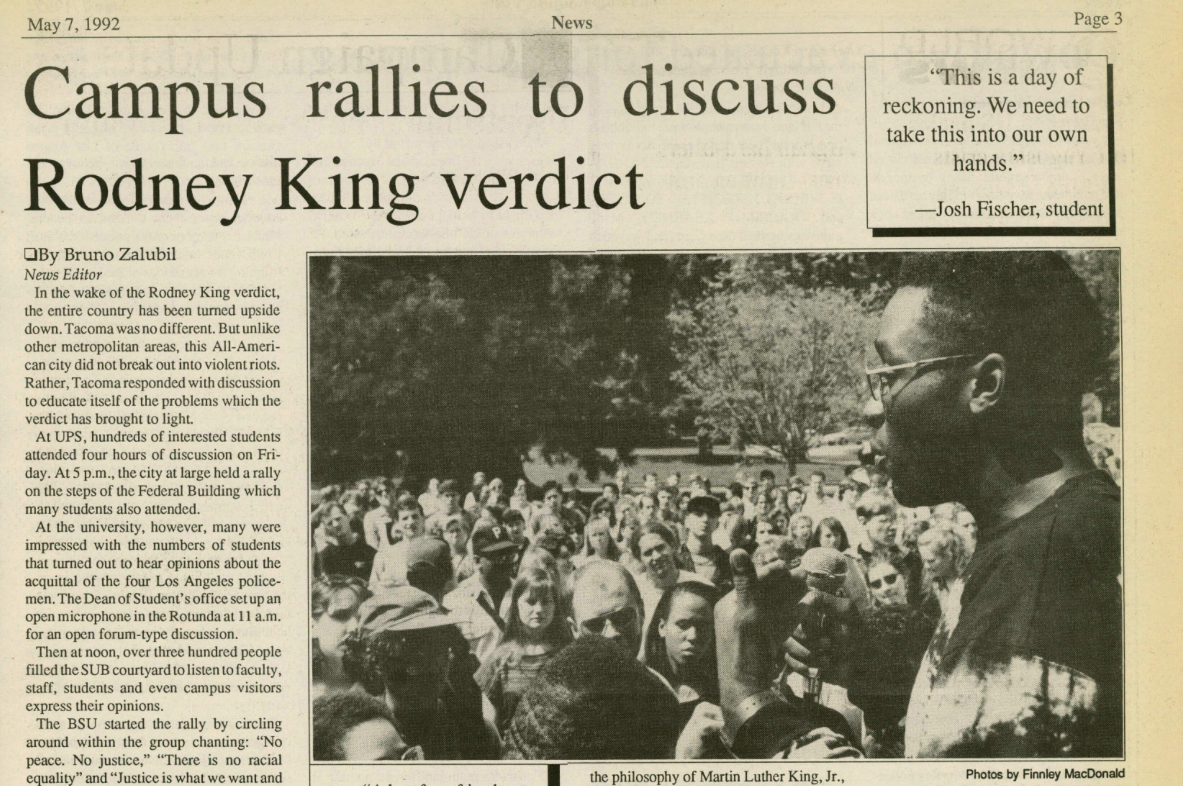Activism in the archives: a look at Puget Sound’s community engagement through the years in honor of Black History Month

By Julia Schiff

Today, the students of The University of Puget Sound express a passion for activism and a desire to be a part of social change. Looking through issues of The Trail from the 1960s through the 1990s, it soon becomes clear that this enthusiasm for advocacy has long been a key feature of the student body. Examining these trends and stories allow us to draw inspiration from former students while also contextualizing the current state of activism at the University.
A call for change and a sudden realization of brutality were highlighted in the May 8, 1992 edition of The Trail. “Campus Rallies to Discuss Rodney King Verdict” was the headline of this powerful article. Students organized to discuss and process the gravity of the Rodney King situation. King was beaten by four police officers in 1991; the maltreatment by officials and the acquittal that followed led to days of rioting, the strongest riots being centered in Los Angeles. The Trail’s report articulated the students’ concern and anger over the verdict that released King’s abusers. “This is a day of reckoning. We need to take this into our own hands,” a statement from then-student Josh Fischer reads. The quotes of students and faculty communicate a desire to move society forward, to avoid the suffocating mistakes of the past. The progressive and assertive nature of the students is demonstrated by this article — it points out the student body’s desire for change.
The same issue of The Trail reported on downtown Tacoma’s own protests in opposition of the verdict of the King trial, including the shutdown of some businesses. The caption under a photo of a man holding an affirmative action sign reads, “This protest proved not to be the spark of violence many thought it would be.” The article quotes different members of the community, reporting on their thoughts on the issue. “I don’t want to be standing here 20 years from now with my great-grandchild experiencing the same injustices we’re experiencing now,” Canada (the only name given in the original article), 29, stated in the 1992 issue.
Looking further back, and deeper into the archives, a 1968 issue of The Trail highlights the Black Power Movement on campus. The front page reads “Black Power at UPS ‘on the move.’” It stresses a change in rhetoric, and a transition from classifications that suggest that people of color were “second class citizens” to using the words “black” and “African American.”
The article continues to explain some of the fundamentals of Black Power, discussing the importance of representation in public office and the movement to improve education through African American Studies departments. An important excerpt reads that an “exceedingly crucial part of Black Power is to create a feeling of Black pride — pride in Black history, in Black culture, in Black accomplishments in general.”
The article also exposes the misunderstanding of what white people at the time felt toward the Black Power movement, addressing that white people’s concern over the movement “stems from fear of violence.” The article then stressed the need for empathy, the need for people to understand that black people have faced over 400 years of white subjugation. Despite it being 50 years old, this article remains incredibly relevant today.
Another 1968 issue of The Trail again features a front-page story that looks at the Black Power movement and the Black Student Union (BSU). It advocated for the introduction of Black Culture Studies, and reported on the University’s promptness in accepting a new African American history course into the humanities. However, in response to that story a different 1968 publication of The Trail features a student’s opinion that “the members of the Black Student Union are guilty of a criminally insane perversion of the educational system.” Puget Sound’s newspapers seemed to serve as a means of communication and dialogue in time of racial turmoil.
Jumping further back again, a 1967 issue of The Trail looks at an important moment in Puget Sound history: the introduction of the Black Student Union. The brief article uses the famous Detroit riots as a segue to introduce the new campus organization. Lou Smith, the chairman of the BSU at the time, stressed the need for “black power” and an understanding of “black humanism.” Today’s Black Student Union operates because of people like Smith, willing to advocate and push for representation and inclusion on campus.
The students of the University of Puget Sound developed a platform for dialogue and a place of learning through The Trail. Looking into the history of our school through the archives gives perspective on who the students were, and more importantly helps us envision who we will be.
